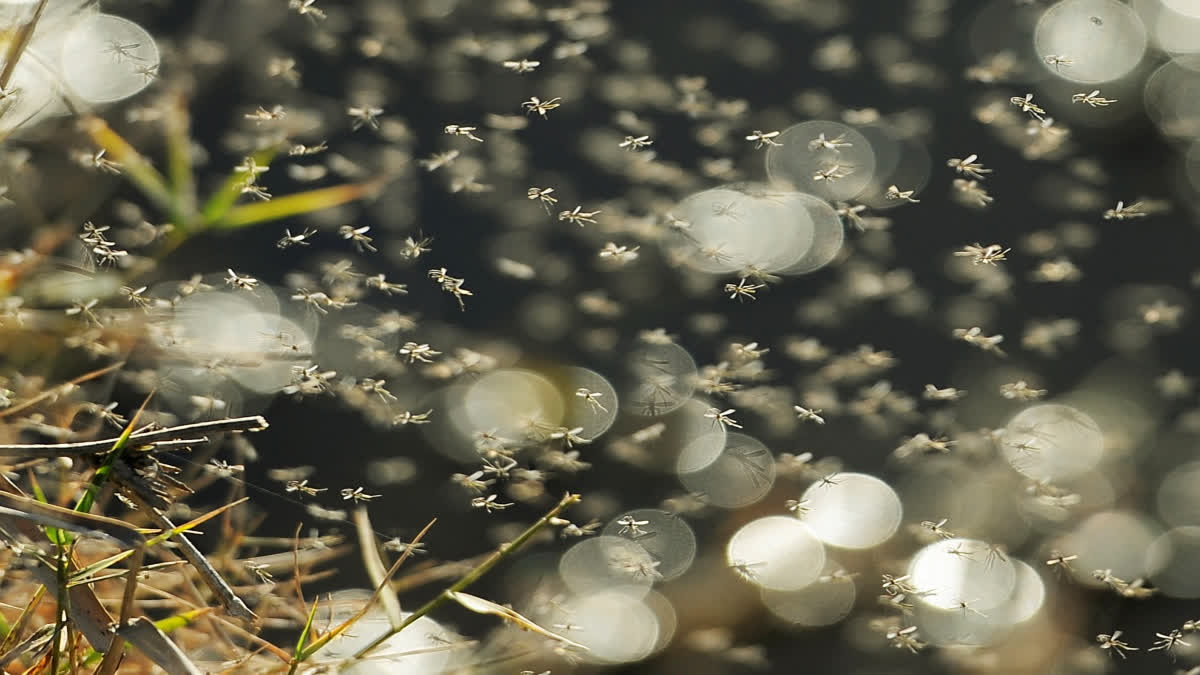Hyderabad: August 20 is observed as World Mosquito Day as it was on this day when Sir Ronald Ross discovered that female mosquitoes transmit malaria between humans.
Mosquitoes are one of the deadliest animals in the world. The Day is marked to fight against vector-borne diseases especially malaria. The World Mosquito Day theme 2024 is “Accelerating the fight against malaria for a more equitable world”.
Malaria
Globally, an estimated 249 million malaria cases occurred in 2022, leading to 608,000 malaria deaths in a single year. Malaria is one of the most severe public health problems, with nearly half of the world's population at risk for infection. In many of the countries affected by malaria, it is the leading cause of death.
Malaria in India
In 2022, India accounted for 66% of malaria cases in the WHO South-East Asia Region noted the new 2023 World Malaria Report published by the World Health Organization (WHO). It adds that almost 46% of all cases in the region were due to Plasmodium vivax, which is aprotozoal parasite and a human pathogen, which is the most frequent and widely distributed cause of recurring malaria.
World Mosquito Day History
World Mosquito Day was first established in 1897 when the link between mosquitoes and malaria transmission was discovered by Sir Ronald Ross. It aims to raise awareness about the causes of malaria and how it can be prevented, as well as fundraising for research into the cure of malaria. It is also a salute to the groundbreaking work of Sir Ross and the scientists who have followed him.
The London School of Hygiene and Tropical Medicine celebrates World Mosquito Day with exhibitions and parties designed both to entertain and to inform, while other celebrations include Malaria No More's 'Mozzy Air' campaign, encouraging people to take anti-malarial when flying to malaria zones, and 'Nothing But Nets’ X campaigns to provide mosquito nets for poor communities.
Sir Ronald Ross worked in the Indian Medical Service when he made his groundbreaking discovery of the malarial parasite in the gastrointestinal tract of a female mosquito. The discovery allowed scientists to better understand the role of mosquitoes in malaria. Ross's discovery also provided a starting point for prevention. In 1902. Ross became the first British person to be awarded the Nobel Prize for Medicine.
Significance of World Mosquito Day 2024
World Mosquito Day, observed on August 20th, plays a crucial role in raising awareness about the health risks posed by mosquitoes, particularly as carriers of deadly diseases like malaria, dengue, and Zika. The day also honours the discovery by Sir Ronald Ross that female mosquitoes transmit malaria between humans, which has been fundamental in developing strategies to combat these diseases.
Raises Awareness: Highlights the global impact of mosquito-borne diseases and the importance of prevention.
Commemorates Discoveries: Honors Sir Ronald Ross’s breakthrough in understanding malaria transmission.
Encourages Action: Promotes public health initiatives and encourages communities to take steps to control mosquito populations.
Global Health Focus: Brings attention to the ongoing fight against diseases like malaria, particularly in regions most affected.
Mosquito-Borne Diseases: Chikungunya, Dengue fever, Eastern and Western equine encephalitis, Japanese encephalitis, La Crosse encephalitis
Malaria, St. Louis encephalitis, West Nile virus, Yellow fever, Zika virus.
Viruses cause most diseases to spread to people by mosquitoes. Malaria is caused by a parasite. Different mosquitoes carry different diseases.
Different Types Of Mosquitoes: Aedes, Anopheles, Culex, Culiseta, Mansonia, Psorophora, Toxorhynchites and Wyeomyia
Fascinating Mosquito Facts
- There are more than 3,000 species of mosquitoes that can be found in virtually every part of the world
- Only female mosquitoes bite because they need the protein from blood to produce their eggs
- Aedes aegypti mosquitoes lay approximately 100 eggs at a time. And those little blood suckers mature fast. The entire Aedes mosquito life cycle—from an egg to an adult—only takes 7-10 days
- The size of a blood meal depends on the species and size of the mosquito. However, some female mosquitoes can drink their entire body weight in blood during a meal. That would be like a 150-pound person consuming 150 pounds of food for dinner
- If you keep getting bitten while those around you don’t, it may be because mosquitoes are attracted to the body chemistry of some people over others
- Mosquitoes are attracted to a combination of body heat, odour, the carbon dioxide that humans and animals emit when they breathe, and lactic acid, an element found in sweat
- Mosquitoes lay their eggs in still or stagnant water or wet earth, and they only need a small amount of water to do so. Some types of mosquitoes can breed in less than a teaspoon of water
- After indulging in a blood meal, female mosquitoes are attracted to dark places to hide and digest their meal. So, they tend to rest on people wearing darker colours
- Arctic researchers uncovered their chests, arms, and legs and reported as many as 9,000 mosquito bites per person, per minute. At this rate, an unprotected human would lose one-half of his or her blood supply in approximately 2 hours
- A mosquito can smell the carbon dioxide you exhale from about 60 to 75 feet away
- Most mosquitoes do not fly very far from their larval habitat, but the salt marsh mosquito migrates 75 to 100 miles throughout its life
- Malaria can be found in over 100 countries. It is a condition that typically impacts the world’s tropical areas. Nevertheless, roughly 70 per cent of the malaria burden around the world is concentrated in 11 countries. One being India, and the rest being on the African continent



